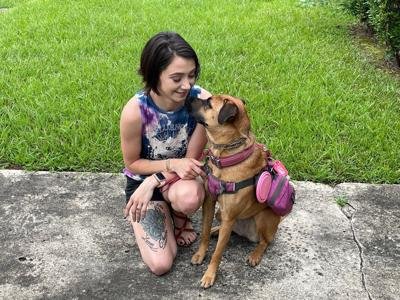
Autism Service Dogs
We are one of the few service dog programs within the U.S. that provides autism service dogs for both children and adults.
Service dogs have the remarkable ability to give their person greater independence, and newfound confidence navigating the world. This is especially true for people and children navigating the world with autism.

Tasks
Each individual is unique, and we account for that during the training process. Your service dog will be matched and individually trained to your lifestyle, needs, and desires.
All of our service dogs learn at least 1 task to help their person manage their disability.
Disrupt emotional and/or sensory overload
Sensory overload and difficulty regulating emotions are common among children and adults with autism. A dog can be trained to disrupt this cycle by pawing, licking, nudging, or laying on top of the individual.
Track a child that wanders away
Unlike humans, dog’s sense of smell is their strongest sense. Children with autism are often prone to quickly wandering away from their guardian’s sight. Dogs can be trained to scent track the child from a large distance. This task helps ease the mind of the parents, and can save a child’s life.
Deep pressure Therapy (DPT)
Deep pressure therapy (DPT) can be utilized in many ways. DPT involves the dog leaning against or lying down on top of you. The warmth, pressure and contact with the dog often reduces anxiety, grounding someone experiencing panic or emotional overload.
DPT can be carried out in many ways depending on the individual’s preference and the size of the dog. The dog could be entirely on top of the person, partially, or with only their head against a person’s chest or lap.
It is important to remember that task selection is individual. Some autistic children and adults may find this type of contact with a service dog calming, while others may find it stressful or upsetting. Dogs have different hair textures which can also make it pleasing or impossible to pet the dog, and is something which will be discussed during the matching process.
Help keeping a child close during outings
Many children with autism are prone to quickly darting away from their parents/guardians. A dog can be tethered to a child by a leash attached to a harness. The dog is trained to lie down when they feel the child leaving their side.
While this task can be incredibly useful, it is not alwyas safe to train. We determine if it is safe depending on the specific child and dog’s size and strength.
Physical buffer within a crowd
Many people with autism experience anxieties with close proximity to others, and/or feel overwhelmed in crowds. A dog can be trained to act as a physical buffer between their person and the general public.
Please note that this is not a protective act, but simple teaching a dog to take up physical space in a specific manner.
Interrupt harmful repetitive behaviors
A dog can be trained to paw, nudge, and lick to stop their person from harmful behaviors such as nail biting, hitting themselves, and picking at their skin.
This task is individually assesed for the dog’s safety in the case of a child or adult frequently hitting, and/or pushing the dog away.
Companionship
While not a task, companionship can be one of the most impactful aspects of an autism service dog. Our service dogs are confident, giving a sense of calm steadiness that can override anxieties in public spaces, and many aspects of psychiatric conditions.
If you need an autism service dog,
contact us today!
Email
rollingmeadowsdogs@gmail.com
Call
336-590-4354
Location
148 Bingham Industrial Drive
Denton, North Carolina, 27239





